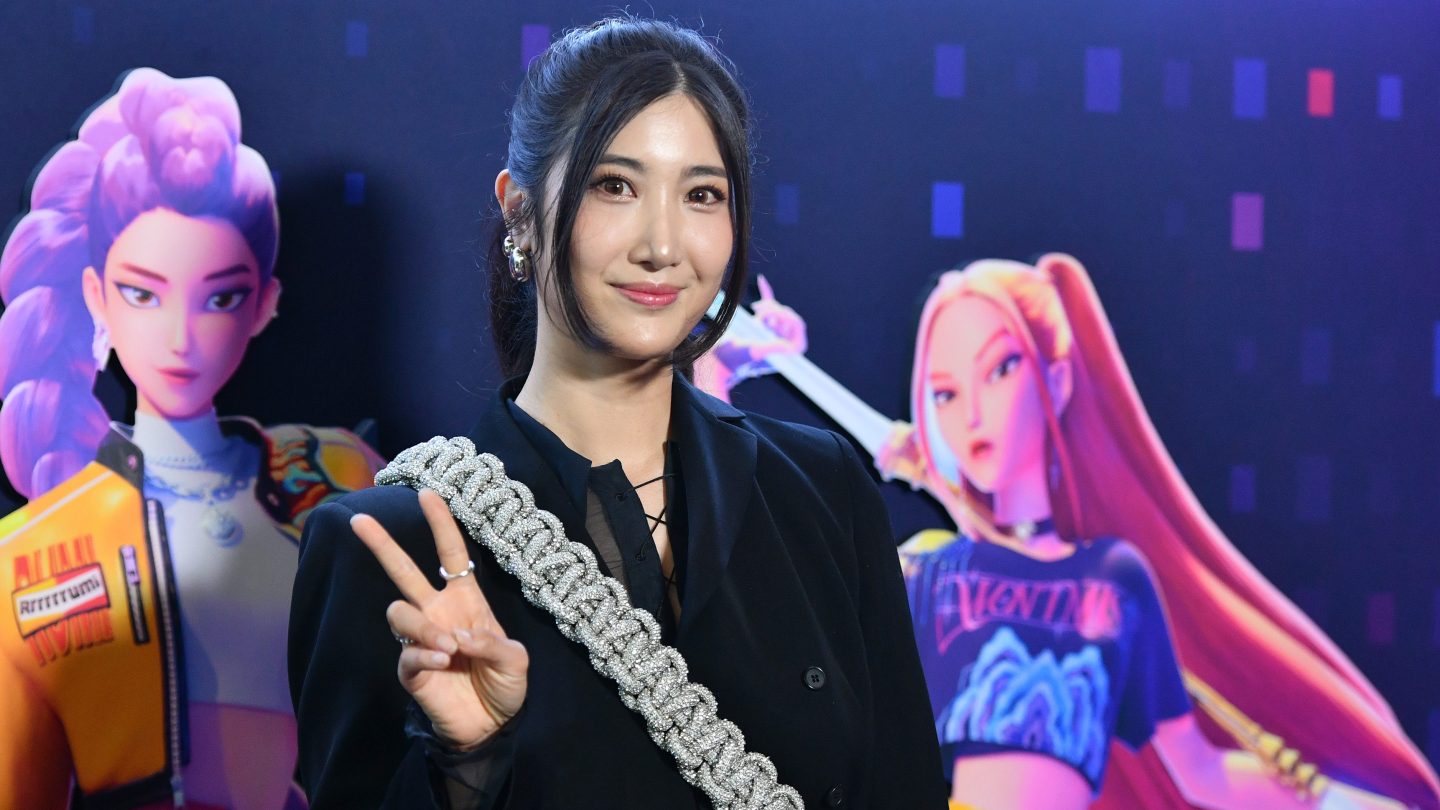As KPop Demon Hunters continues to grow into a full blown cultural phenomena, Netflix is preparing to put a sing-along version of film into theaters this weekend.
EJAE, the singing voice of Rumi and one of the songwriters responsible for some of the film’s biggest hits, stopped by an advanced screening of the sing-along at Netflix’s Hollywood headquarters Tuesday night. The 33-year-old was met much fanfare from the intimate crowd.
“I’m speechless. This has all been insane. I’ve been crying a lot,” she jokingly told the crowd, which included her Rumi voice actor counterpart Arden Cho, co-director Chris Appelhans and Ken Jeong, who voices Bobby in the film. She thanked the crowd for loving the film on behalf of the entire film.
EJAE, who spent a decade as a K-pop idol trainee, is credited as a co-writer on three of the film’s songs – “How It’s Done,” “Golden” and “Your Idol.” The latter two currently sit at No. 2 and No. 4 on the Billboard Hot 100 chart. It’s no surprise, given EJAE’s experience in the realm of K-pop, having written songs for some of the industry’s biggest talents including Twice, Aespa, Le Sserafim and Red Velvet.
Last week, EJAE and the rest of the fictional girl group Huntrix (Audrey Nuna and Rei Ami round out the vocal cast), ended Alex Warren’s long-running No. 1 streak to take the top spot on the chart. A moment the singer calls “absolutely crazy.”
Before Tuesday night’s screening, EJAE spoke with The Hollywood Reporter about the success of “Golden” and its journey to No. 1 and bringing her K-pop knowledge to the film.
What did it feel like hitting No. 1 on the Billboard Hot 100 with “Golden?”
Hitting No. 1 is absolutely crazy. I cried all day, literally, and the first thing I thought about was me as a kid. I’m just so happy I made little 11-year-old Ejae’s dream come true.
Obviously it’s exciting as a singer to have this song be a success, but what does it mean to you as one of the songwriters?
That’s the part that is so validating. Writing songs is very personal. It can feel like you’re showing people your diary or even melodically or anything. It feels really, really gratifying to have people really connect with something I co-wrote. That song, the melody came out so fast, so it’s so cool seeing people sing it and hearing my voice on the radio is so odd.
What has been the craziest part of this whole journey?
Everything’s been crazy. It’s literally just happening so fast. I think the craziest is truly when I’m on TikTok, and I see a person I don’t know in their house and they’re singing “Golden.” The kids just loving it. That’s just crazy. It’s so interesting.
The voice actors for Huntrix told me that you and the rest of the singers didn’t actually hear their voices before recording.
No.
What was the process like trying to match to a voice you didn’t actually know?
I was on the project for a long time, and I remember when the directors told us that they found Mira, Zoey and Rumi. They were so excited, so I was really curious. I did know generally, talking to the directors, what their voices would be like. It was really cool to see it in the movie and exactly be what I imagined. That was very exciting, and they did an incredible job. Seriously.
What is the one thing that you hope people take away about you after the success of this film?
That I am honestly just so humbled and grateful and honored to have people actually love the songs that I worked hard on. Lots of sleepless nights and allnighters. I’m just really, really grateful.
You’re well versed in the world of K-pop songwriting. Others on the project were as well, but from what I udnerstand you were a bridge into this world. What was it like bringing that experience to the film?
I think the fact that I’m Korean-American, being bilingual, was truly helpful. I did write all the Korean lyrics in the movie except for “Soda Pop.” That was really helpful. When I was writing the “[Hunter’s] Mantra,” knowing the old school Korean kind of speak and being able to weave in Korean and English there seamlessly. I grew up half in the States, half in Korea, so having that knowledge was super key in finding a sound that can work in both ways and also lyrically. I think that was important. Also, me training as a K-pop idol for over a decade was very, very helpful. Just being a K-pop writer myself, I definitely incorporated that knowledge. Interestingly, K-pop is really, really maximalist, so it translated very naturally into cinematic songs and sound. I think those were the two very helpful things I think I brought.
